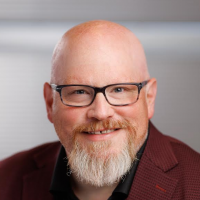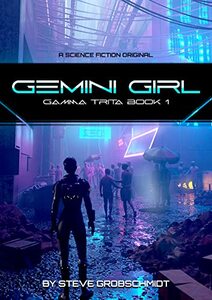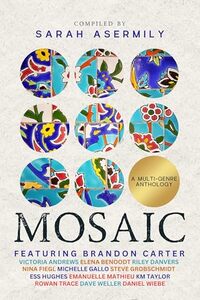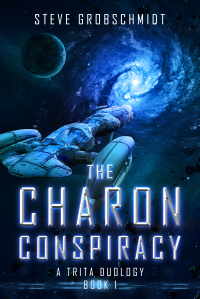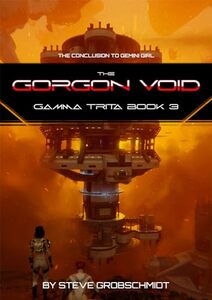Genre:
LGBT Science Fiction Fantasy- Country: United States
- Books: 4
- Profession: User Experience Designer
- Born: 8 August
- Member Since: Nov 2023
- Profile Views: 2,570
- Followers: 56
At a young age, Steve Grobschmidt fell in love with science fiction and fantasy because of classics like Star Wars, Blade Runner, Star Trek, and Raiders of the Lost Ark. Some 80s young adult series like "Wizards, Warriors & You" and "Time Machine" inspired him to write his own silly works under his pen name King Richard, just for family and friends.
Really, he's just one big unapologetic nerd. Gemini Girl, the first book of the Gamma Trita Series, was his first published work. It's been followed by sequel The Divided Man, with The Gorgon Void coming soon to complete the tri... logy.
Steve lives in Milwaukee, Wisconsin with his wife Tamara and their rescue dog Benji.
read more
Steve Grobschmidt's Books
Stay in the loop on books by Steve Grobschmidt. See upcoming and best-selling books by the author here. You'll also find the deals on books by Steve Grobschmidt.
** Please note that the information or price displayed here may not be the updated. Make sure to double-check the latest book price before buying books.
** Also, there might be other books by Steve Grobschmidt not listed on AllAuthor.
| Book |
|---|
Gemini Girl (Gamma Trita Trilogy Book 1)by Steve GrobschmidtPublish: Mar 01, 2023Series: Gamma Trita TrilogyLGBT Science Fiction |
The Gorgon Void (Gamma Trita Trilogy Book 3)by Steve GrobschmidtPublish: Jan 31, 2024Series: Gamma Trita TrilogyLGBT Science Fiction |
Steve Grobschmidt Interview On 16, May 2024
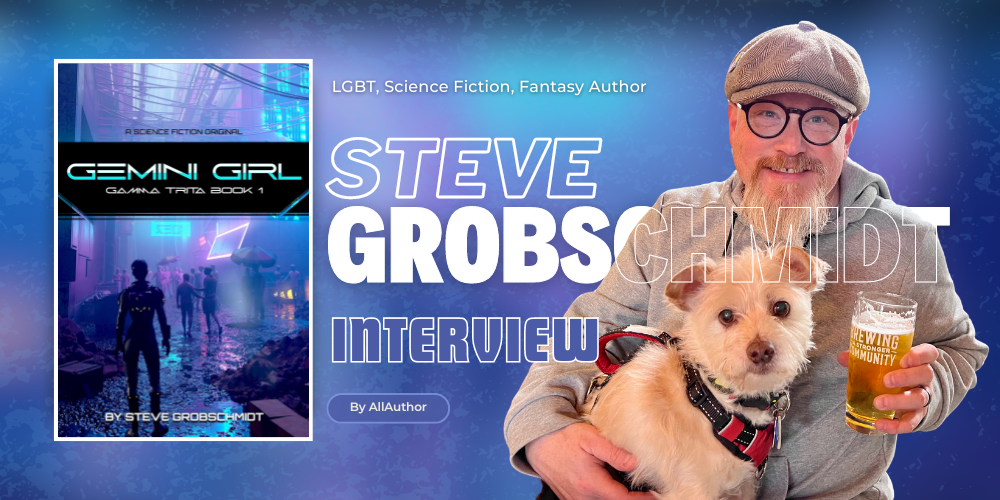 "Steve Grobschmidt has been a devoted aficionado of science fiction and fantasy since his formative years. Residing in the vibrant city of Milwaukee, Wisconsin, Steve shares his life with his cherished wife, Tamara, and their beloved rescue dog, Benji. With each page turn, Steve invites readers on a thrilling odyssey through the boundless expanses of his imagination, where adventure knows no bounds and the cosmos await exploration."
"Steve Grobschmidt has been a devoted aficionado of science fiction and fantasy since his formative years. Residing in the vibrant city of Milwaukee, Wisconsin, Steve shares his life with his cherished wife, Tamara, and their beloved rescue dog, Benji. With each page turn, Steve invites readers on a thrilling odyssey through the boundless expanses of his imagination, where adventure knows no bounds and the cosmos await exploration."
I grew up in the 70s and 80s and loved Star Wars, Star Trek, Blade Runner, and all the influential movies and shows of the time. There were some lesser known movies like Krull that equally inspired me. That, plus a lifelong fascination with historical periods like medieval Europe and the Roman Empire. I have two older brothers and they did their own thing a lot, so I got used to entertaining myself as a little kid — I’d draw, write, work up wild adventures with action figures, etc. We also, in the mid 80s, got the first model of Macintosh computer and I spent way too many hours on it, including playing text-only games that really fueled my imagination and built up my vocabulary.
Can you share some of your earliest memories of engaging with classic sci-fi/fantasy works like Star Wars and Blade Runner?I remember watching Star Wars over and over as a kid and while I probably didn’t understand all the nuances of Blade Runner when I was very young, the visuals and characters still left an impact. My parents bought me Star Wars action figures, books, and other collectibles that I’d play with or read for hours on end, fueling my own imagination.
You mentioned being inspired by young adult series like "Wizards, Warriors & You" and "Time Machine." How did these influences shape your writing style and storytelling approach?Those two book series were huge pieces of my creativity upbringing. I still remember, in grade school, being home sick one day and my mom buying me the first books of each series. I read them many times, then over the years got other books in the series. I would even try to write my own installments, particularly for WW&Y. To this day, I have both series and occasionally read them. My writing style, especially early on, emulated the WW&Y style of having fearless heroes in the service of the king, battling threats that challenge the kingdom.
What prompted you to start writing under the pen name King Richard, and how did your friends and family react to your early works?Back when I was a kid, I was kind of fearless in my writing and didn’t overthink it like I do now as an adult. So of course, pre-teen Steve felt he needed a pen name (even though my audience was all family who knew the real me!). My family was always very supportive. In particular, my grandma read every single story I wrote. That’s why I dedicated my first published work — Gemini Girl — to her. When she passed away, we found a folder with everything I wrote as a kid in it. That was incredibly touching.
Could you tell us about the journey from writing for friends and family to getting your first book, Gemini Girl, published?That was a leap that took me a very long time to make. When I was young, I felt a safe zone in friends and family so I fearlessly wrote whatever popped in my head. As I got older, the self-doubt and “nobody’s going to like this” crept in. That’s why my writing became so infrequent in adult life — I’d start things, get discouraged, and abandon them. Finally, in fall of 2022, I got sick of that mentality and decided to finish what would become Gemini Girl. I knew enough about Amazon self publishing that nothing was stopping me…so I went for it.
The Gamma Trita Series began with Gemini Girl. What inspired the storyline and characters for this series?There are a few sources of inspiration. The entire premise of somebody not realizing who they really are, but launching into a self preservation they didn’t know they possessed was something I always wanted to try after reading what remains my favorite science fiction series — Roger Zelazny’s Amber Chronicles. Video games like Mass Effect, TV shows like Babylon 5 and Blake’s 7, and so many books I’d read gave me so many ideas to build my own world. Probably the biggest influence that got me going to actually finish Gemini Girl was the video game Cyberpunk 2077.
The sequel to Gemini Girl, The Divided Man, has been well-received. How does it continue the narrative arc established in the first book?I feel I hit a stride with The Divided Man. I’m really proud of Gemini Girl, but TDM kicks up the action, suspense and “who can you trust?” suspense. Gemini Girl introduced us to Lorelei Ogden, but TDM plunges her into more danger. It also builds upon the budding relationship between Ogden and April Vasquez. And we get to meet a fascinating new character named Charity.
What can readers expect from the upcoming conclusion to the trilogy, The Gorgon Void?The Gorgon Void completes the trilogy and came out in January. It brings the entire saga to a head as Ogden and her allies try to stop a very dangerous operation that has implications for the entire system. Ogden is now fully in control of her dual nature and ready to take on even more desperate missions in her quest. It brings the story to a satisfying conclusion — and yet it shows we’re not done in the Gamma Trita universe.
Are there any specific themes or messages you hope readers take away from the Gamma Trita Series as a whole?A few. One, Ogden’s journey of self-discovery shows that every thing you learn and every building block in your life, no matter what, shapes who you are today. She struggles with the duality of her nature, and yet forges a unique path ahead that makes her even better. There are also elements of love and doing whatever you have to to protect those you love.
How do you approach world-building in your sci-fi/fantasy novels, particularly in creating the setting for the Gamma Trita universe?I’ve struck a balance where I’ve fleshed out a lot of aspects of the world, but I haven’t gone so crazy that I get bogged down in details or paint myself in corners. It’s a “just enough” approach to make the setting feel deep and rich, without going overboard. I do have many ideas on how to expand the universe though, and a dream of one day having a web site or wiki with all of that detail.
Could you share a bit about your writing process? Do you have any rituals or habits that help you stay focused and productive?I make an initial outline, as much as I can, from beginning to end of the book I’m about to write. It doesn’t have every detail of course, but enough to get me going and avoid me meandering. Then I’ll just write, and I can’t emphasize that enough — my mortal enemy in writing is overthinking. For example, I’m working on my fourth book right now and a voice keeps telling me that the writing is terrible and clumsy and it feels like I forgot how to write in between books! But I know it’s the first draft and it’ll get better. So in short — my biggest thing is just hammering away, and worrying about the quality later. You’ve got plenty of rounds of revising and editing to fix that! Occasionally, I play a particular playlist on Spotify while I’m writing — it’s a mix of techy music that brings out the cyberpunk vibes, and video game soundtrack music. Although it can’t have words in it or it’ll be a distraction!
How do you balance your love for classic sci-fi/fantasy tropes with bringing fresh, original ideas to your work?I think it’s important not to get fixated on one thing. I cite Cyberpunk, Mass Effect, Star Trek, etc…but I make sure, even within the realm of sci-fi, be diverse in what I read, watch, and play. My Gamma Trita universe is inspired by little bits here and there, many things that are original, and even stuff from the modern world. Diversity is key.
What has been the most challenging aspect of being an author, and how have you overcome it?The toughest thing is that inner voice telling you you’re not good. It’s what leads to giving up or extended writer’s block. I overcome it by, as I said before, just blazing forward. There is nothing quite as satisfying as completing a draft. Another challenge is unreasonable expectations — when you go the indie route, it’s very hard to get noticed and build a brand. It’s very easy to be discouraged when social media posts get little to no reaction, or when you go long stretches without book sales — but I remind myself that my reason for going on this journey is because I love it and am passionate about it. Sales may or may not come, but I don’t ever want it to feel more like a business than a labor of love.
You reside in Milwaukee, Wisconsin. Has your local environment or community influenced your writing in any significant way?While maybe not directly, I’d say my happiness in this community contributes to my mental well-being and gives me the boost to write. Milwaukee is a great place to live — it’s a big city but doesn’t really feel like it. There’s a lot to do outdoors, we have a big lake to enjoy…it’s a really inspiring location. Sometimes I go to coffee shops to write and the atmosphere fosters my creativity.
Judging from your experience so far, how would you rate and review AllAuthor?I’ve been enjoying my experience! I have a lot of fun with the Magic Tool and Seasonal Mockups — things like that have helped me generate diverse and interesting promotional imagery for my social media exploits. I also love poking around on AllAuthor to learn about other writers and what they’ve published. And of course answer questions like these!
Ask Steve Grobschmidt a Question
Have brimming questions to ask author Steve Grobschmidt? Ask whatever you like, but keep it appropriate.
** Please note that unanswered questions will not appear on the page. Refrain from posting promotional messages.
